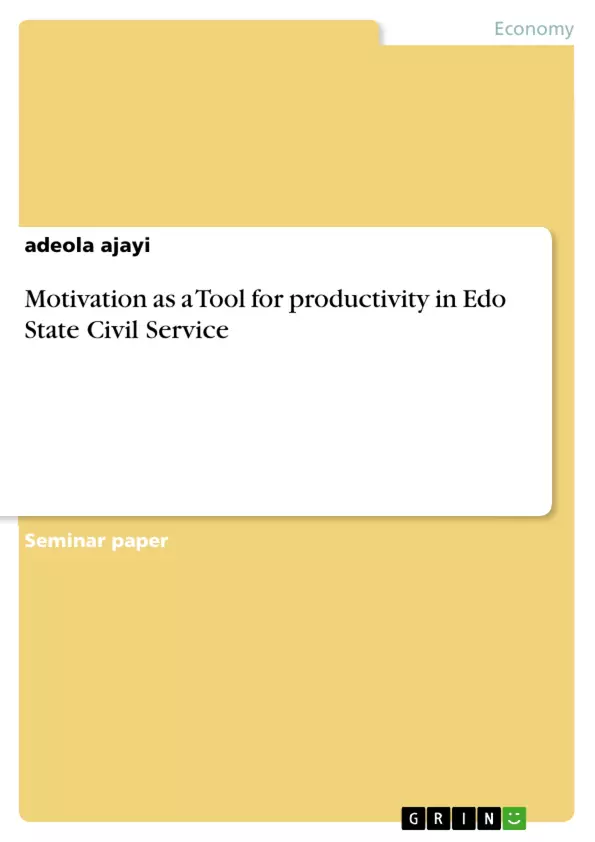The study examined motivation as a tool for productivity in the Nigerian civil service: A case study of Edo State Civil Service. It also identified the motivational strategies that exist in Edo State Civil Service. In addition, the degree of implementation of these motivational strategies in Edo State Civil Service was examined as well as the effectiveness of the identified motivational strategies on the productivity of the Civil Servants in Edo State.
The study used both primary and secondary data. The study revealed that the civil service in Edo State enjoys some motivational incentives from the State Government, although the motivational incentives are rarely implemented in the State Civil Service. They study revealed that increase in remuneration among others like reward for loyalty, availability of opportunity and provision of working tools are motivational mechanisms adopted by the Edo State Civil Service towards increase in employees’ productivity.
The finding of the study revealed that job satisfaction level of staffs of Edo State civil Service is affected or determined by a number of factors which include wages and salary, pension and gratuity, promotion work environment and the work condition. The study also revealed that the Edo State Civil Service motivational strategies like prompt payment of salary and granting of housing and car loans are poorly implemented. The study posits that the morale and initiatives of the Edo State Civil Servants is dampened due to the improper implementation of these motivational strategies which may not at all times be disconnected from politics of favouritism and nepotism.
The study concluded that employers should be able to help employees see that the organization can help them satisfy their needs and utilize their potentials to contribute to the achievement of the organizational goal. Workers are affected by different needs at different times; this means that individual worker is motivated differently. Also, those human needs could be interdependent and overlapping. The government should endeavour to integrate goals of the organization with those of its employees and continuer to adopt the supportive management technique.
Table of Contents
- CHAPTER ONE
- LITERATURE REVIEW
- Introduction
- The Concept of Motivation
Objectives and Key Themes
This study examines the role of motivation in enhancing productivity within the Nigerian civil service, specifically focusing on the Edo State Civil Service. It aims to identify existing motivational strategies, assess their implementation, and analyze their effectiveness in boosting civil servant productivity.
- Motivation as a tool for productivity in the Nigerian civil service
- Motivational strategies employed in the Edo State Civil Service
- Implementation and effectiveness of motivational strategies
- Factors influencing job satisfaction among Edo State civil servants
- The impact of political factors on motivational strategies
Chapter Summaries
- CHAPTER ONE: LITERATURE REVIEW
- Introduction: This section introduces the study's focus on motivation within the Nigerian civil service, highlighting the importance of efficient service delivery and the challenges faced by civil services in developing countries.
- The Concept of Motivation: This section explores the historical and contemporary perspectives on motivation. It examines various theories and definitions, discussing the role of rewards, needs, and goal-setting in motivating individuals. The potential consequences of low morale and the relationship between employee motivation and organizational loyalty are also discussed.
Keywords
The study centers on the concepts of motivation and productivity within the context of the Nigerian civil service, specifically examining the Edo State Civil Service. Key themes include motivational strategies, job satisfaction, implementation effectiveness, political influence, and the impact of motivational strategies on civil servant productivity.
- Citation du texte
- adeola ajayi (Auteur), 2010, Motivation as a Tool for productivity in Edo State Civil Service, Munich, GRIN Verlag, https://www.grin.com/document/196691



